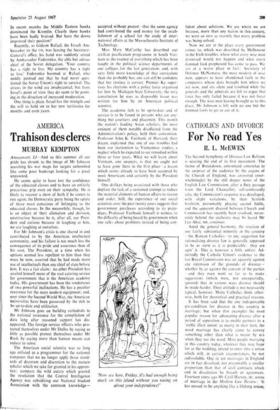Trahison des clercs
AMERICA MURRAY KEMPTON
Amagansett, L/—And so this summer all our pride has shrunk to the image of Mr Johnson searching his war maps for targets unbombed like some poor bankrupt looking for a jewel unpawned.
He seems quite to have lost the confidence of the educated classes and to have an unfairly precarious grip even on their sympathy. He is likely to recover a show of both if he comes to run again, the Democratic party being the opiate of those most conscious of belonging to the educated classes. In the meanwhile, though, he is an object of their alienation and derision, unattractive because he is, after all, our Presi- dent and curious because in laughing at him, we are laughing at ourselves.
For Mr Johnson's crisis is one shared in and contributed to by the American intellectual community, and his failure is not much less the consequence of its pride and assurance than of his own. The President, at a time when his options seemed less repellent to him than they must be now, asserted that he had made more use of intellectuals than any chief of state before him. It was a fair claim: no other President has availed himself more of the vast catering service for government that is the American academy today. His government has been the rendezvous of two powerful inclinations. He has a peculiar reverence for the most modern equipment; and, ever since the Second World War, the American universities have been possessed by the itch to be up-to-date and utilitarian.
Mr Johnson goes on building cathedrals to the national reverence for the compilation of data long after reasoned support has dis- appeared. The foreign service officers who pro- tected themselves under Mr Dulles by saying as little as possible protect themselves under Mr Rusk by saying more than human means can reduce to sense.
. The American social scientist was so long ago enlisted as a programmer for the national computer that we no longer apply those stand- ards of decorum and discretion to the mature scholar which we take for granted in his appren- tice: compare the wild outcry which greeted the revelation that the Central Intelligence Agency. was subsidising our National Student Association with the common knowledge—
accepted without protest—that the same agency had contributed the seed money for the estab- lishment of a school for the study of inter- national affairs at the Massachusetts Institute of Technology.
Miss Mary McCarthy has described our civilian pacification programme in South Viet- -nam as the essence of everything which has been taught in the political science departments of our colleges for the last generation; and, with very little more knowledge of that curriculum than she probably has, one can still be confident that her instinct is correct. Premier Ky super- vises his elections with a police force organised for him by Michigan State University; the very constitution he uses as disposable tissue was written for him by an American political scientist.
The academic itch to be up-to-date and of service is to be found in persons who are any- thing but courtiers and placemen. This month the nation's leading Asian scholars, the most eminent of them notably disaffected from the Administration's policy, held their convention. Professor John K. Fairbank of Harvard. their doyen, explained that one of our troubles had been our inattention to Vietnamese studies, a neglect which he expected to see remedied within three or four years. What we will learn about Vietnam, one suspects, is that we ought not to have gone there in the first place—a lesson which seems already to have been accepted by most Americans and certainly by the President .himself.
One dislikes being associated with those who deplore the lack of a sustained attempt to reduce the material elements of human affairs to reason and order. Still, the experience of our social scientists over the past twenty years suggests that government purchases according to its preju- dices; Professor Fairbank himself is witness to the difficulty of being heard by government when one talks about problems instead of being con- fident about solutions. We are where we are because, more than any nation in this century, we were so sure so recently that every problem was being solved.
Now we are at the place every government comes to, which was described by Melbourne in the Irish troubles, where what every wise man promised would not happen and what every damned fool prophesied has come to pass. We are at a worse place in fact: Secretary of Defence McNamara, the most modern of wise men, appears to have abandoned faith in the computers whose data brought him where we are now, and sits silent and troubled while the generals and the admirals are left to argue that torce has only failed because it was not force enough. The wise men having brought us to this place, Mr Johnson is kit with no one but the damned fools to get us out of it.






























 Previous page
Previous page